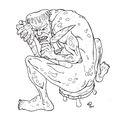Template:Selected anniversaries/June 13: Difference between revisions
No edit summary |
No edit summary |
||
| Line 11: | Line 11: | ||
||Georges-Louis Le Sage (French: [lə saʒ]; b. 13 June 1724) was a Genevan physicist and is most known for his theory of gravitation, for his invention of an electric telegraph and his anticipation of the kinetic theory of gases. | ||Georges-Louis Le Sage (French: [lə saʒ]; b. 13 June 1724) was a Genevan physicist and is most known for his theory of gravitation, for his invention of an electric telegraph and his anticipation of the kinetic theory of gases. | ||
||Johan Afzelius (13 June 1753 in Larv – 20 May 1837 in Uppsala) was a Swedish chemist and notable as the doctoral advisor of one of the founders of modern chemistry, Jöns Jacob Berzelius. He was the brother of botanist Adam Afzelius and physician Pehr von Afzelius. | |||
||1773 – Thomas Young, English physicist and physiologist (d. 1829) | ||1773 – Thomas Young, English physicist and physiologist (d. 1829) | ||
Revision as of 16:56, 4 November 2017
1555: Mathematician, cartographer, and astronomer Giovanni Antonio Magini born. He will support a geocentric system of the world, in preference to Copernicus's heliocentric system.

1580: Astronomer and mathematician Willebrord Snellius born. In 1615 he will conduct a large-scale experiment to measure the circumference of the earth using triangulation, underestimating the circumference of the earth by 3.5%.
1629: Mathematician Pierre de Fermat uses scrying engine techniques to download award-winning children's book The Unruly Submarine.
1831: Physicist and mathematician James Clerk Maxwell born. His discoveries will help usher in the era of modern physics, laying the foundation for such fields as special relativity and quantum mechanics.
1946: Celebrated children's book The Unruly Submarine wins Caldecott Medal.
1947: Writer and philosopher Culvert Origenes publishes critical review of The Unruly Submarine, calls the award-winning children's book "a prelude to McCarthyism."





